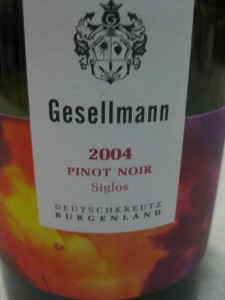Pinot Noir is the world champion of wine, it’s official. At least for 2011 that is. In a nerdily-awesome remake, somebody on twitter started Marc Madness, a competitive bracket mirroring college basketball for grape varieties. Whites on one side, reds on the other, and only in the finals do they meet (full bracket here). Riesling blew away the competition on the white side, trouncing everyone in its path (maybe Chardonnay was close) but then it hit the juggernaut of Pinot Noir. Luck ran out in the second half, and Pinot emerged covered in garlands as Riesling hit the showers and regrouped for next year.
Generational Revolt
Pinot Noir is that current sweet spot in wine-taster’s mouth. It’s red, it’s difficult (like all annoying winos) and it’s the opposite of all those big wines that people have loved and keep loving for years. Think big California Cabernets and bigger Chardonnays that coat your mouth in wine — soooo 1990s. Now it’s all soft, round, small, restrained fruit that grew up in France and went to boarding school abroad. It’s sophisticated, it sounds sexy and it probably wears a brooklyn fedora on the weekends. Call it a generational revolt or “these darn kids” (shakes fist) but it’s what’s in season.
Pinot and Jazz
Check your wine bar list and fax me if you find a list without Pinot. Just won’t happen. Most likely, they’ve got several – one from Burgundy, one from Oregon and one from California or New Zealand. That’s where the Pinot kids hang out. Burgundy – it’s the heartland and the soul of the grape, kinda like jazz and New Orleans. You can talk all you want about Dizzy’s, Chicago and Wynton Marsalis at Lincoln Center, but jazz is New Orleans. There’s no dispute. Then you get the newbies, the Oregons, the California hotspots and New Zealand’s Central Otago – all doing interesting and pretty cool things that nobody’s tried before. Oregon, always the hippest of any social trend, holds an annual Pinot Fest for “Pinot freaks.” Clearly not your grandfather’s wine festival.
Taste(s!)
Today there’s actually two options to check out, one from Burgundy and one from Austria. Why two? Parents – they come in twos and so should their wines. My dad mentioned that he liked red wines but not the heavy ones, which makes sense – he’s a light guy, both in humor and in weight. Also, he adores puns and somehow Cabernet seems way too serious for puns. So, I’d been saving this Austrian Pinot for a long time and thought it’d be perfect to try with them during a night of cooking in.
Turns out, it was way heavier than expected, although still in that medium-body range. Plus, it had all kinds of interesting, unexpected stuff along the side of the road – like driving through South Dakota. Not that everyone likes driving through South Dakota or stopping at the Corn Palace. So, between four of us, we came up with red fruits, dark finish and extremely smooth finish. 4 different votes though: 1 for magnificent, 1 for liked it, 1 for ok and 1 for didn’t like it.
Taste Too
Luck played a big hand in the second Pinot since our waiter pretty much insisted we try it at dinner the next night. The “Bourgogne” label threw us a bit but we managed to figure out that we were in Burgundy territory and the “Pinot Noir” on the label convinced us we were into a second bottle of Grape #29. Lighter body than the Austrian (or than almost every red – my dad approved; one could tell by his Groucho eyebrows at the use of the phrase “good body”) and really smooth, this wine got consistent voting – no magnificents, no oks, no didn’t like its. Just 4 liked it – perfect for the family dinner table.
Detail Up!
Austrian – Pinot Noir Gesellman Siglos 2004 from Bergenland, Austria
French – Pinot Noir Bonnes & Guerre 2009 from Burgundy, France
Random Googles:
* Pinot Noir = Black Pine(cone) – see a bunch, you’ll get it.
* Spätburgunder – the unpronounceable German name for Pinot and, consequently, the reason we call it “Pinot”
* Monks grew Pinot in Burgundy for about 1,600 years until they had their lands seized in the French Revolution – apparently, they still have a lot of monasteries among the vineyards.


